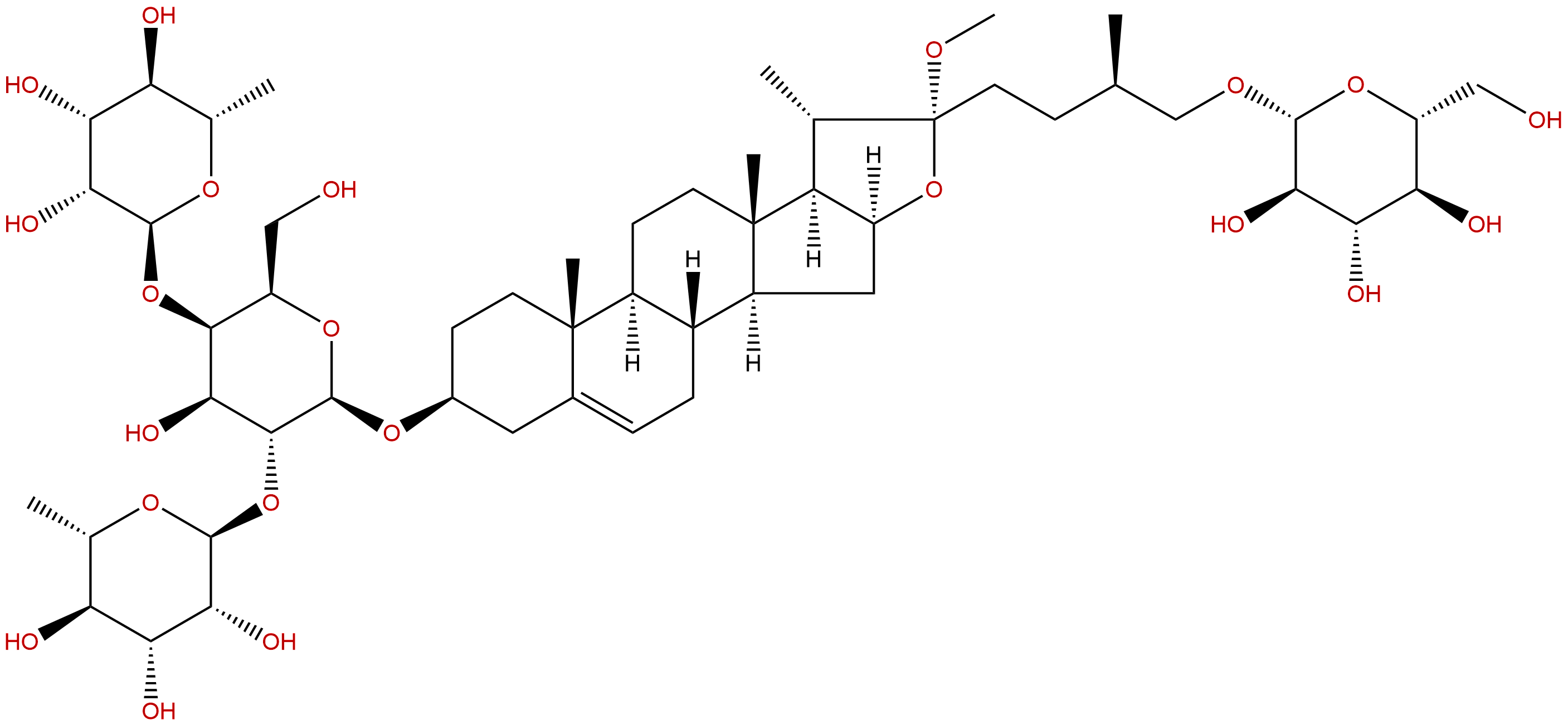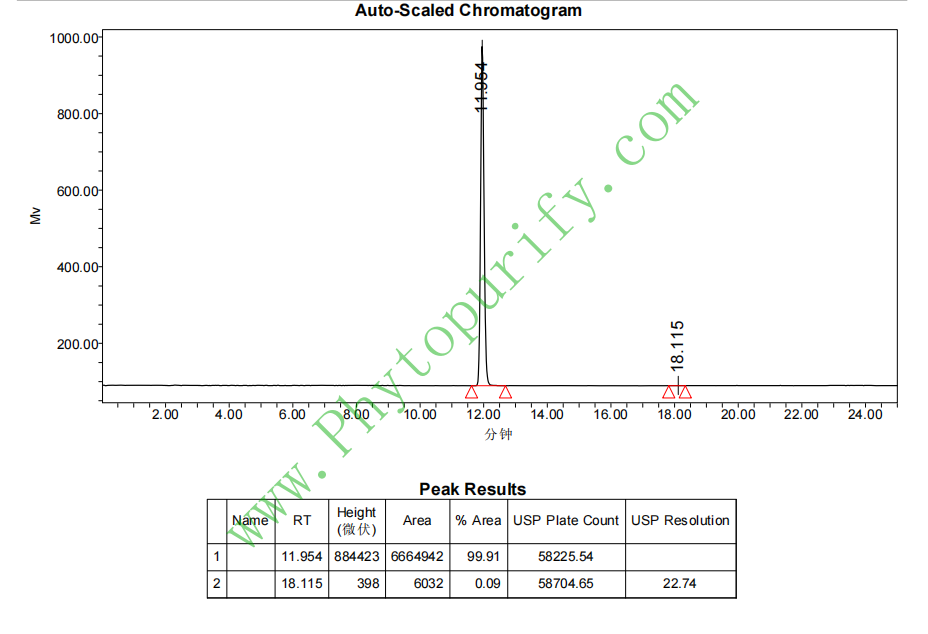
Methyl protodioscinCAS No.:54522-52-0
|
||||||||||
 |
|
|
||||||||

| Catalogue No.: | BP0939 |
| Formula: | C52H86O22 |
| Mol Weight: | 1063.24 |
Synonym name:
Catalogue No.: BP0939
Cas No.: 54522-52-0
Formula: C52H86O22
Mol Weight: 1063.24
Botanical Source:
Purity: 95%~99%
Analysis Method: HPLC-DAD or/and HPLC-ELSD
Identification Method: Mass, NMR
Packing: Brown vial or HDPE plastic bottle
Can be supplied from milligrams to grams.
For Reference Standard and R&D, Not for Human Use Directly.
Inquire for bulk scale.
Description:
Methyl protodioscin has anti-thrombosis, antiosteoporotic, anti-myocardial infarction, and cytotoxic activities. Methyl protodioscin shows strong cytotoxicity against most cell lines from solid tumors with GI50 ≤10.0 microM, but moderate cytotoxicity is shown against leukemia cell lines with GI50 10-30 microM. It potentially increase HDL cholesterol while reducing LDL cholesterol and triglycerides, it also can treat diverse inflammatory pulmonary diseases.
References:
Pharmacogn Mag. 2014 Jul;10(39):318-24.
Methyl protodioscin induces G2/M cell cycle arrest and apoptosis in A549 human lung cancer cells.
Methyl protodioscin (MPD) is a furostanol bisglycoside with antitumor properties. It has been shown to reduce proliferation, cause cell cycle arrest. The present study elucidates the mechanism underlying MPD's apoptotic effects, using the A549 human lung cancer cell line.
METHODS AND RESULTS:
The human pulmonary adenocarcinoma cell line A549 was obtained from the Cell Bank of the Animal Experiment Center, North School Region, Sun Yat-Sen University. All of the cells were grown in RPMI 1640 supplemented with 10% fetal calf serum (Hyclone, Logan, UT, USA), penicillin (10,000 U/l), and streptomycin (100 mg/l) at 37°C in a 5% CO2 humidified atmosphere. The induction of apoptosis was observed in flow cytometry and fluorescent staining experiments. MPD showed growth inhibitory effects in A549 cells in a dose- and time-dependent manner. The significant G2/M cell cycle arrest and apoptotic effect were also seen in A549 cells treated with MPD. MPD-induced apoptosis was accompanied by a significant reduction of mitochondrial membrane potential, release of mitochondrial cytochrome c to cytosol, activation of caspase-3, downregulation of Bcl-2, p-Bad, and upregulation of Bax.
CONCLUSIONS:
Our results show that the induction of apoptosis by MPD involves multiple molecular pathways and strongly suggest that Bcl-2 family proteins signaling pathways. In addition, mitochondrial membrane potential, mitochondrial cytochrome c and caspase-3 were also closely associated with MPD-induced apoptotic process in human A549 cells.
Cancer Invest. 2003 Jun;21(3):389-93.
The cytotoxicity of methyl protodioscin against human cancer cell lines in vitro.
Methyl protodioscin (NSC-698790) was a furostanol saponin isolated from the rhizome of Dioscorea collettii var. hypoglauca (Dioscoreaceae), a Chinese herbal remedy for the treatment of cervical carcinoma, carcinoma of the urinary bladder, and renal tumors for centuries.
METHODS AND RESULTS:
To systematically evaluate its potential anticancer activity, Methyl protodioscin was tested cytotoxicity in vitro against human cancer cell lines by the NCI's (National Cancer Institute) anticancer drug screen. As a result, Methyl protodioscin showed strong cytotoxicity against most cell lines from solid tumors with GI50 < or = 10.0 microM, especially selectively against one colon cancer line (HCT-15) and one breast cancer line (MDA-MB-435) with GI50 < 2.0 microM but moderate cytotoxicity was shown against leukemia cell lines with GI50 10-30 microM.
CONCLUSIONS:
The data are consistent with the fact that the rhizome of D. collettii var. hypoglauca has been employed for the treatment of solid tumors rather than leukemia in China for centuries. Based on an analysis using the COMPARE computer program with Methyl protodioscin as a seed compound, no compounds in the NCI's anticancer drug screen database have cytotoxicity patterns similar to those of Methyl protodioscin, indicating a potential novel mechanism of anticancer action.
Phytomedicine. 2015 May 15;22(5):568-72.
Dioscin and methylprotodioscin isolated from the root of Asparagus cochinchinensis suppressed the gene expression and production of airway MUC5AC mucin induced by phorbol ester and growth factor.
The root of Asparagus cochinchinensis (Lour.) Merr. has been utilized as mucoregulators and expectorants for controlling the airway inflammatory diseases in folk medicine. We investigated whether dioscin and Methyl protodioscin isolated from the root of Asparagus cochinchinensis (Lour.) Merr. suppress the gene expression and production of airway MUC5AC mucin induced by phorbol ester and growth factor.
METHODS AND RESULTS:
Confluent NCI-H292 cells were pretreated with dioscin or Methyl protodioscin for 30 min and then stimulated with EGF or PMA for 24 h. The MUC5AC mucin gene expression was measured by RT-PCR. Production of MUC5AC mucin protein was measured by ELISA. (1) Dioscin and Methyl protodioscin suppressed the expression of MUC5AC mucin gene induced by EGF or PMA; (2) dioscin suppressed the production of MUC5AC mucin induced by either EGF at 10(-5) M (p < 0.05) and 10(-6) M (p < 0.05) or PMA at 10(-4) M (p < 0.05), 10(-5) M (p < 0.05) and 10(-6) M (p < 0.05); (3) Methyl protodioscin also suppressed the production of MUC5AC mucin induced by either EGF at 10(-4) M (p < 0.05) or PMA at 10(-4) M (p < 0.05).
CONCLUSIONS:
These results suggest that dioscin and Methyl protodioscin isolated from the root of Asparagus cochinchinensis suppress the gene expression and production of MUC5AC mucin, by directly acting on airway epithelial cells, and the results are consistent with the traditional use of Asparagus cochinchinensis as remedy for diverse inflammatory pulmonary diseases.
HPLC of Methyl protodioscin
